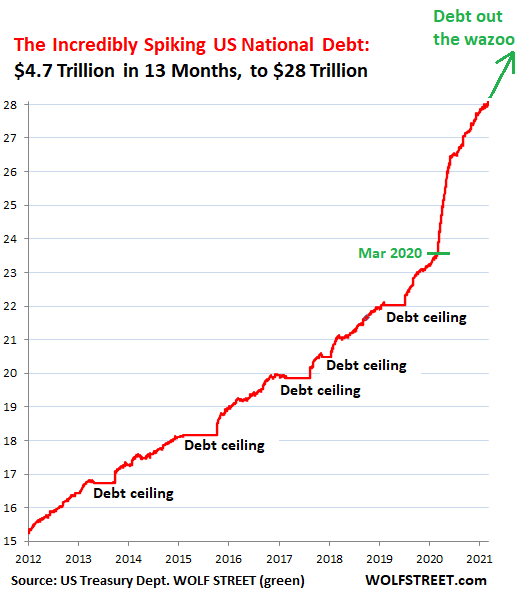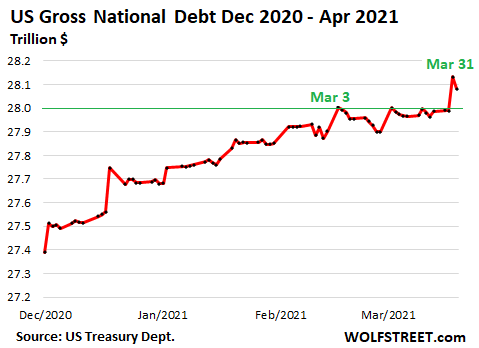
Piet Mondriaan Composition in color A 1917



Barkley
Charles Barkley spittin truth! it’s all about the divide and conquer agenda pic.twitter.com/E81b2Pw2h4
— Luke Rudkowski (@Lukewearechange) April 4, 2021

Excellent.
Charles Hoskinson is the founder of Cardano and co-founder of Ethereum, two cryptocurrencies.
• Yet Again on Covid (Hoskinson)

“To compare Covid to the Second World War, as the 24 leaders have done, and argue that it needs a post-WW2 style settlement, surely redefines the word ‘hyperbolic.’ ”
• The Great Covid Power Grab (Clark)
Johnson, Macron and Merkel have warned that the world needs a settlement to protect itself in the wake of Coronavirus. The question, as ever, must be: ‘who benefits?’ The answer, as ever, is ‘it’s unlikely to be you.’ “Out with nationalism and isolationism and in with international ‘Health and Security’!” That’s the cry from 24 world leaders, led by the British Prime Minister Boris Johnson, French President Emmanuel Macron and German Chancellor Angela Merkel. The call for a new global ‘pandemic preparedness’ treaty came in a letter to the Daily Telegraph and in papers across the world. The letter uses words and phrases such as ‘solidarity,’ ‘global community,’ ’international cooperation’ and ‘protect’ repeatedly, to make us all feel that what is being proposed is for the good of us all. But is it?
If we read between the lines, we can see quite clearly that, while the plan is supposed to be about post-Covid pandemics, it is really about making sure that the draconian measures introduced since 2020 are maintained as long as possible. The ‘nobody is safe until everyone is safe’ mantra which appears at the end of the second paragraph in the letter, is saying to us – as Merkel and other globalists have strongly hinted – that restrictions cannot and will not be lifted until everyone in the world has been vaccinated. If you have any doubts, just take a look at the very next sentence, which states: ‘We are therefore committed to ensuring universal and equitable access to safe, efficacious and affordable vaccines, medicines and diagnostics for this and future pandemics.’ Translation: ‘Africa, you’re going to take the vaccines we offer you whether you like it or not.’
To justify a ‘pandemic treaty,’ and other long-planned changes being implemented in its wake, they have to accord Covid a very special status. The first sentence of the letter boldly states: ‘The Covid-19 pandemic is the biggest challenge to the global community since the 1940s.’ But is that really true? Hong Kong flu claimed the lives of between one and four million people between 1968 and 1970. But it got a lot less coverage than Covid. There was no talk of a permanent ‘New Normal’ being established in 1970, or the need for a post-WW2-like settlement. Neither was there when HIV/AIDS hit in the 1980s. The UN says between 24.8m and 42.2 million people had died of AIDS-related illnesses by the end of 2019.
To compare Covid to the Second World War, as the 24 leaders have done, and argue that it needs a post-WW2 style settlement, surely redefines the word ‘hyperbolic.’ A reminder: some 75 million people died in the Second World War – including around 27 million citizens of the former Soviet Union. 60 million Europeans became refugees. By contrast, the current number of deaths ‘with’ Covid is 2.8 million. Yes, that’s serious –and all deaths are very sad– but the numbers alone can’t explain why it’s Covid –and not other diseases which killed many more and came before it– which necessitates a ‘Great Reset’.

6 states have now passed similar laws: Wisconsin, Nebraska, Florida, Ohio, Missouri and Kentucky.
• Kentucky Passes A Philosophical Exemption Law For Vaccines (ky.gov)
AN ACT relating to exceptions to mandatory immunization requirements and declaring an emergency.
Amend KRS 214.036 to provide exemptions from mandatory immunization for any child, emancipated minor, or adult who, personally or by a parent or guardian, submits a written sworn statement objecting to the immunization based on conscientiously held beliefs; prohibit any administrative regulation, administrative order, or executive order from requiring during an epidemic the immunization of persons who submit either a written sworn statement objecting to the immunization based on conscientiously held beliefs or the written opinion of the person’s physician that such immunization would be injurious to the person’s health; require the Cabinet for Health and Family Services to develop and make available on its Web site a standardized form relating to the exemptions from mandatory immunization and to accept the form after it is submitted; amend KRS 209.552 and 214.034 to conform; EMERGENCY.

And so it begins.
• Covid Passport Trials Begin With Live Comedy Night (BBC)
The government is to trial a series of measures in England, including Covid passports, to allow the safe return of sports matches, events and nightclubs. Passes would show if a person had been vaccinated, had a recent negative test, or natural immunity. Trial events in the coming months will also explore how ventilation and testing before and after could help crowds return. Any use of passes would be “time-limited”, the sports minister has said. The pilots, which will include the FA Cup final, will last until mid-May, and some of the listed events will not be trialling vaccination certification, including those taking place in Liverpool.
Sports Minister Nigel Huddleston described the trials as a “learning experience”, saying no decisions had yet been made on processes or vaccination certificates. He said the earlier pilots “almost certainly won’t involve any element of certification”, and that the government would also be looking at mitigations such as one-way systems and hygiene measures. Mr Huddleston said the PM would receive a report on the trials at the end of May, and suggested further events could be added later in the year.


Give people back the responsibility taken away from them.
• Everyone in England to be Offered Twice-weekly Covid Tests (G.)
Boris Johnson is to unveil a plan for routine, universal Covid-19 tests as a means to ease England out of lockdown, as the government faced a renewed backlash over the idea of app-based “passports” to permit people entry into crowded places and events. Six months after Johnson unveiled plans for “Operation Moonshot”, a £100bn mass testing scheme that never delivered on its stated aim of preventing another lockdown, all people in England will be offered two Covid tests a week from Friday. The prime minister is to announce the rollout of the lateral flow tests at a press conference on Monday afternoon, at which he will also outline a programme of trial events for mass gatherings, as well as proposals for potentially restarting foreign travel.
The testing scheme, involving kits for use at home or at test centres, workplaces and schools, is billed as a means to limit any continued community transmission of the virus, in parallel with the vaccination programme, and as a way to track outbreaks of potentially vaccine-resistant Covid variants. The test-and-trace phone app will also be updated so that when pubs and other hospitality venues reopen everyone in a group will have to register, not just the lead person, with those who test positive asked to share other places they have visited. Some scientists have expressed scepticism at the plan, noting both the possibility of false negatives with lateral flow tests, and the need for better support for people to self-isolate if they do test positive.
Civil liberties groups and many MPs will also be wary if the new testing system potentially feeds into a regime of Covid certificates, which would use recent tests, vaccination or the presence of antibodies to the virus to determine entry to pubs or mass events. Sometimes also called “Covid passports”, these would be purely for domestic use, and would be distinct from a vaccination record to allow foreign travel.

There’s a research deficiency about vitamin D deficiency. “This supports arguments for designing clinical trials”?
• High Vitamin D Levels May Protect Against Covid-19 (UCM)
A new research study at the University of Chicago Medicine has found that when it comes to COVID-19, having vitamin D levels above those traditionally considered sufficient may lower the risk of infection, especially for Black people. The study, published in JAMA Open Network on March 19, retrospectively examined the relationship between vitamin D levels and likelihood of testing positive for COVID-19. While levels of 30 ng/ml or more are usually considered sufficient, the authors found that Black individuals who had levels of 30 to 40 ng/ml had a 2.64 times higher risk of testing positive for COVID-19 than people with levels of 40 ng/ml or greater. Statistically significant associations of vitamin D levels with COVID-19 risk were not found in white people.
The study looked at data from more than 3,000 patients at UChicago Medicine who had had their vitamin D levels tested within 14 days before a COVID-19 test. The research team is now recruiting participants for two separate clinical trials testing the efficacy of vitamin D supplements for preventing COVID-19. This research is an expansion of an earlier study showing that a vitamin D deficiency (less than 20 ng/ml) may raise the risk of testing positive for COVID-19. In the current study, those results were further supported, finding that individuals with a vitamin D deficiency had a 7.2% chance of testing positive for the virus. A separate study recently found that more than 80% of patients diagnosed with COVID-19 were vitamin D deficient.
“These new results tell us that having vitamin D levels above those normally considered sufficient is associated with decreased risk of testing positive for COVID-19, at least in Black individuals,” said David Meltzer, MD, PhD, Chief of Hospital Medicine at UChicago Medicine and lead author of the study. “This supports arguments for designing clinical trials that can test whether or not vitamin D may be a viable intervention to lower the risk of the disease, especially in persons of color.” Meltzer was inspired to investigate this topic after seeing an article in early 2020 that found people with vitamin D deficiency who were randomly assigned to receive vitamin D supplementation had much lower rates of viral respiratory infections compared to those who did not receive supplementation. He decided to examine data being collected at UChicago Medicine on COVID-19 to determine the role that vitamin D levels might be playing.
“There’s a lot of literature on vitamin D. Most of it has been focused on bone health, which is where the current standards for sufficient vitamin D levels come from,” Meltzer explained. “But there’s also some evidence that vitamin D might improve immune function and decrease inflammation. So far, the data has been relatively inconclusive. Based on these results, we think that earlier studies may have given doses that were too low to have much of an effect on the immune system, even if they were sufficient for bone health. It may be that different levels of vitamin D are adequate for different functions.”

“..not the more expansive spending Biden envisions to create jobs, fight climate change and stand up to a rising China..”
• Republicans Dangle ‘Easy’ Win For Trimmed Biden Plan (F24)
Republicans opened the door Sunday to supporting a pared down version of Joe Biden’s $2 trillion infrastructure plan, saying concentrating on physical improvements would deliver an “easy bipartisan win” for the US president. Biden’s American Jobs Plan — the second massive spending initiative of his 10-week old administration, after a $1.9 trillion short-term Covid rescue bill — would modernize America’s public works and make its energy system greener. But the proposal announced last week faces major hurdles in Congress amid criticism from Republicans and business lobbies who oppose the higher corporate taxes that would pay the bill.
Roy Blunt, the chairman of the Senate Republican Policy Committee, implored Democrats to focus on the traditional pillars of infrastructure — “roads, bridges, ports and airports” — and not the more expansive spending Biden envisions to create jobs, fight climate change and stand up to a rising China. Blunt spoke out as senior administration figures hit the Sunday talk show circuit to sell the policy to the American people as a vital component of sustained job growth. “I’ve reached out to the White House a couple of times now and said, you’ve got an easy bipartisan win here if you’ll keep this package nearly focused on infrastructure,” Blunt told ABC’s “This Week.”
That would not prevent the administration from later pushing through the other aspects of its plan on a partisan basis, he said. Blunt complained that the package contained more for electric vehicle charging stations than for physical improvements. “When people think about infrastructure, they’re thinking about roads, bridges, ports and airports,” he told ABC. Blunt, a senior member of Senate leadership team, struck a more conciliatory tone than the chamber’s Republican leader Mitch McConnell, who had earlier vowed to fight the Biden plan “every step of the way.”

It’s become fully abstract.
• US National Debt Passes $28 Trillion, +$4.7 Trillion in 13 Months (WS)
It finally happened, that glorious moment, when, after teetering on the verge for weeks – for reasons we’ll get into shortly – the incredibly spiking US gross national debt, after kissing the line a couple of times for a moment, finally, and suddenly by a big leap, jumped over the $28-trillion mark, with a $143-billion leap in one day on Wednesday, March 31, following some big Treasury sales. It gave some of that up on Thursday as some bonds matured. And it now amounts to $28.08 trillion, as per US Treasury Department on Friday. The US gross national debt has now spiked by $4.7 trillion in 13 months since the end of February 2020, in the days before this show started.

The flat spots in the chart are the visual depictions of a charade unique to American politics, the periods when the debt bounced into the Debt Ceiling. Those were the days when everyone in Congress was still trying to hijack the Debt Ceiling law to get their favorite spending priorities! If it looks like the trillions have been whizzing by a little less fast in recent months, that the growth of the debt has somehow slowed, that is correct. The chart below magnifies the daily debt levels since December. On March 3, the debt level touched $28 trillion but only barely and just for one day, before backing off, and then kissed it again on March 17, only to back off again and remain tantalizingly close, but no cigar, until Wednesday, when it did the deed with one huge $148-billion leap:

The reason for this slowdown in borrowing is that the government sold a gigantic amount of debt last spring, adding $3 trillion to its debt in a few months, and then didn’t spend all of it, but kept the unspent amounts in its checking account – the General Treasury Account or GTA — which ballooned to $1.8 trillion by July, from the pre-crisis range between $100 billion and $400 billion. During the final months of the Mnuchin Treasury, it was decided to start spending down the balance in the checking account by borrowing a little less, and by early January, the GTA had dropped to $1.6 trillion.

Erdogan wants to dig a new canal and bypass the 1936 Montreux Convention.
• Turkey and the Suez ‘Heart Attack’ (K.)
Turkey continues to threaten to depart from the 1936 Montreux Convention that governs free shipping through the Bosporus strait. The accident in the Suez Canal served as the excuse for the speaker of Turkey’s Grand National Assembly, Mustafa Sentop, to imply as much last week, even if he had to go back on his statement due to the tense situation between Ankara and Washington. Turkish President Recep Tayyip Erdogan also proclaims this departure when he wants to utilize it geopolitically and when talking about his announced pharaonic intention of constructing a second canal in the Bosporus – one unregulated by international conventions. Could Turkey close the strait and block the passage of both merchant and military ships between the Mediterranean and the Black Sea, depending on what serves its interests?
According to the Montreux Convention, merchant ships enjoy freedom of passage and navigation in the strait, irrespective of their flag and cargo. The convention allows Turkey to militarize the strait and permits the Black Sea countries freedom of passage for military ships provided they give a week’s notice, and substantially restricts the passage of military vessels that are not from the Black Sea states (notification of crossing, tonnage restrictions, armament restrictions, aircraft carriers cannot pass, and others). All of this in a time of peace, which, however, is threatened by Erdogan’s controversial views on the Aegean and the Eastern Mediterranean, as well as the atmosphere in the Black Sea, reminiscent of the Cold War, where Ukraine is the epicenter of looming dark clouds and, according to analysts, will likely remain a source of global tension.
The Suez “heart attack” brought up questions on safe passage into and out of the Mediterranean, as much for the merchant fleets as the navies that move between the Red Sea, Gibraltar and the Bosporus, with the latter crossing attracting the attention of military and commercial organizations around the globe, given the volatile geopolitical situation in the wider region. Turkey, if it deems necessary, does not need to bar the gate to stop traffic in the Bosporus and the Dardanelles. All it has to do is conjure up an accident by scuppering two ships in the straits, without being accused of violating the Montreux Convention. That is why the West is feverishly readying the “continental straits” between Alexandroupoli and Burgas as an alternative, while NATO equips the fleets of Romania and Bulgaria.

And he really wants to. These guys sent an open letter warning about the Montreux Convention and he just has them arrested.
• Ten Retired Admirals Detained in Turkey as Erdogan Warns of New Coup (GR)
Turkey detained 10 retired admirals on Monday, as President Recep Tayyip Erdogan warned of a new coup following a letter signed by more than 100 retired admirals warning about a possible threat to a treaty governing the use of Turkey’s key waterways. The Ankara chief public prosecutor’s office said arrest warrants have been issued for the 10. Prosecutors also ordered four other suspects to report to Ankara police within three days, opting not to detain them because of their age. The development comes a day after the letter was sharply condemned by the government, which said the move is “reminiscent of coup times” in Turkey’s past. Turkey’s approval last month of plans to develop a shipping canal in Istanbul comparable to the Panama or Suez canals has opened up debate about the 1936 Montreux Convention.
The admirals said in their letter that apart from its environmental impact, the new canal venture could undermine the Montreux accord. The convention guarantees the free passage through the Bosphorus and Dardanelles straits of civilian vessels in times of both peace and war. It also regulates the use of the strait by military vessels from non-Black Sea states. The new canal would allow ships to transit between the Mediterranean and the Black Sea without passing through part of the straits that are covered by the treaty. The declaration has drawn strong reactions from the government and officials. Presidential Spokesperson Ibrahim Kalın said the statement is “reminiscent of coup periods” and made the former soldiers “a laughingstock.” “Know your place and stay where you are,” he added.

Probe started in 2018 and he just found out yesterday?
• Hunter Biden Is ‘100% Certain’ DOJ Probe Will Clear Him Of Wrongdoing (JTN)
Hunter Biden, the son of President Joe Biden, has expressed complete confidence that he will be cleared at the conclusion of the Justice Department’s probe into his finances. During a CBS Sunday Morning interview, Hunter Biden said that he is fully cooperating with the investigation. He said that he is “100% certain that at the end of the investigation, that I will be cleared of any wrongdoing.” “I learned yesterday for the first time that the U.S. Attorney’s Office in Delaware advised my legal counsel, also yesterday, that they are investigating my tax affairs,” he said in a statement back in December. “I take this matter very seriously but I am confident that a professional and objective review of these matters will demonstrate that I handled my affairs legally and appropriately, including with the benefit of professional tax advisors.” Fox News reported that “according to a source familiar with the matter,” the probe started in 2018.

We try to run the Automatic Earth on donations. Since ad revenue has collapsed, you are now not just a reader, but an integral part of the process that builds this site. Thank you for your support.

What America does best is produce the ability to accept failure.
– Nassim Nicholas Taleb



Support the Automatic Earth in virustime. Click at the top of the sidebars to donate with Paypal and Patreon.











